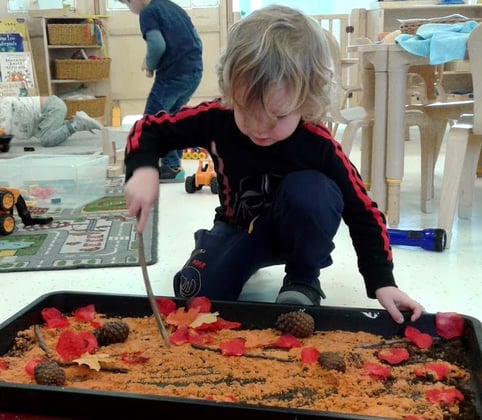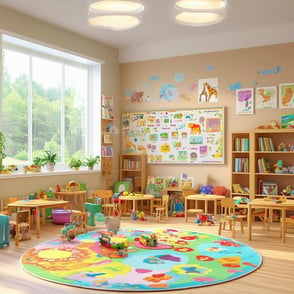Everyday, we use our five main senses to understand and explore the world around us: touch, sight, smell, hearing and taste. Sensory play includes activities which engage these senses, such as playing with water, sand, play-dough and rice. The range of activities is unlimited in scope and you may find that you are engaging in sensory play without even realising it! For example, playing outside is a natural way for children to connect and discover their senses - it is a fundamental pillar of Early Years Education
There are a multitude of benefits to sensory play, from cognitive development to confidence. Today we will explore six reasons why sensory play is important and what value these activities add to children’s education.
1. Children Learn Sensory Attributes
Firstly, children need help learning how to use their senses. By engaging in sensory play, they can develop an understanding for how each of their senses are used individually and collectively. For example, when playing with water, a child will become familiar with the sound of water splashing, the wet feel of the water on their skin and how water looks when it is rippling. They also pay attention to attributes of the water such as its temperature. The information that is collected through play is then combined to provide a full picture of what is in front of them.
2. Helps Language Development
By better understanding their senses, children can increase their vocabulary base and communicate more effectively. Textures and flavours can be explored and used to describe their experiences. For example, children can start to describe food as sour, sweet or bitter and they can describe surfaces as smooth or rough. By engaging in sensory play, these distinctions are made clear and obvious.
Sensory play also offers children the opportunity to bond and connect. Playing together allows children to engage with their peers and further develop their social interaction skills, through sharing and negotiating, in a fun and exciting setting.
3. Develops Motor Skills
Sensory play helps children to improve both fine and gross motor skills. Sensory play activities often include motions such as pouring, stacking, squeezing, pushing, pulling and balancing. These movements engage a range of muscle groups, helping to build strength and dexterity.
In addition, these movements help children to develop spatial awareness and hand-eye coordination. Although some activities may become messy very quickly, your child is beginning to comprehend concepts such as capacity and weight, through actions such as estimating if a jug is full or empty. Overtime, movements will become more precise and controlled.
4. Fosters Problem Solving Skills
Sensory play often includes challenges, such as learning how to stack objects on top of each other by balancing them or fitting one object through another, which requires an understanding of size, distance and shapes. These challenges help to foster judgment and reasoning skills, which can then be transferred to other aspects of learning. Therefore, sensory play is important for developing decision making and problem solving skills.

5. Understanding More Complex Tasks
A good foundational understanding of the senses will provide a roadmap for learning more complex skills later in adolescence. Sensory play helps build nerve connections in the brain, which aids memory function and recall.
Further, the enhanced motor skills that were developed through play will help children with tasks such as using cutlery to eat, opening and closing zippers to get dressed and learning how to use a pencil to write their name.
6. Helps to Calm Children
Sensory play has been proven to calm and relax children. It is particularly useful for children with autism or processing disorders. The sensory stimulation can help children concentrate and reduce anxiety. Therefore, it is a useful tool for helping children learn in a stress-free manner.
One of the key components to sensory play is allowing children the autonomy to play freely and explore at will. Creating activities which have clear boundaries, such as limiting the materials to the sensory bin, yet which offer a degree of flexibility, will allow children to self regulate their behaviour and mood.
Overall, we hope that we have been able to shed light on why sensory play is important and that you enjoy sensory play activities with your child! Remember, it takes time for children to fully explore and investigate an activity. Allow ample time for children to play, and keep instructions to a minimum.
Tags:
Early Years
09-Dec-2020 15:53:48
Related Articles





Write a Comment